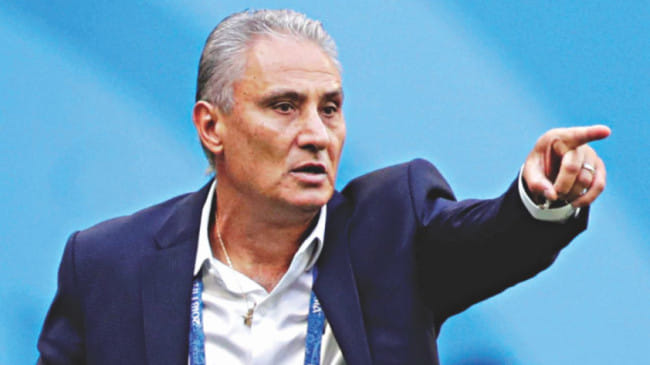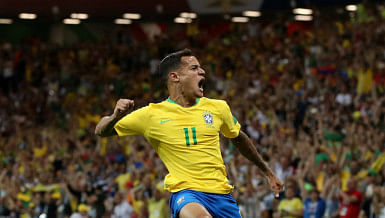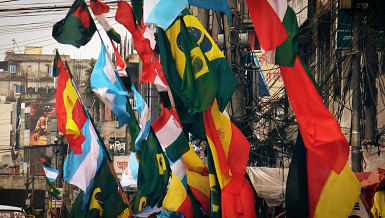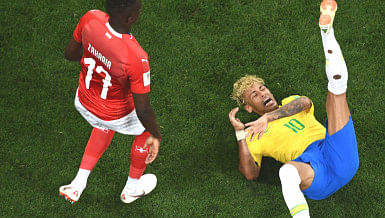I have had the opportunity to attend three press briefings by Brazil coach Adenor Leonardo Bacchi. At every single one, he was addressed as Tite, the man at the centre of Brazil's campaign for a sixth World Cup title in Russia. Some even prefer to address him as 'The Professor', a name his players know him by. The 57-year-old took charge of the Selecao following six World Cup qualifier matches at a point when they were struggling to perform. Things changed after that as Brazil became the first of 31 teams to book their ticket to Russia.
Tite made Brazil look almost invincible in the remaining qualifying matches and in the nine friendlies he was at the helm for. He transformed Dunga's unimaginative side into an aggressive unit that has shown signs of the creativity and brilliance that has enamoured the great South American nation to the world.
Apart from the success he has brought Brazil so far, Tite is perhaps most loved for his clarity in thinking, assertive approach and the role of father figure that he plays.
Against Serbia, when Brazil were under serious pressure for six minutes early in the second half, he introduced Fernandinho in place of Paulinho, effectively turning the game Brazil's way again.
“At that point, the game was asking for Fernandinho who articulated the passes when Serbia were building. And we resumed control, especially in the central midfield, and continued attacking,” Tite said matter-of-factly after the game.
He was under tremendous pressure regarding the overflowing emotions of Neymar, who cried after the Costa Rica win. The question appeared as a daily dose in his briefings since. But he doused it with a fantastic defence and at the same time he did enough to control the emotion of his players, which was evident in the game against Serbia.
“I would like to say that that is how Brazil is as a nation. Against Ecuador [after the win in Copa America], Tite cried. I'm going to say it again, Tite cried thrice after that game because I was happy, and that's our emotional characteristic. I cried of pride and pleasure in the moment of so much pressure. But I'm just trying as the coach who also has feelings and who understands that emotion has to be balanced and adjusted,” he said ahead of Brazil's game against Serbia.
“This is the kind of game where emotional pressure is very high. There is the risk of Brazil being eliminated tomorrow. It's all a set of conditions. I think the emotional aspect will grow but the physical and technical aspects will prevail in the game. And tactically, all of the aspects we worked on, we are very well prepared for a great match,” he continued.
After the Serbia match, a reporter termed his pre-tournament forecast for the first three games as prophetic. But he is a different breed.
“I can say 500 things and I got three right. You can say a lot of things -- it could be this, it could be that, and one of them came to fruition. You have to believe in the process of building the team. Otherwise you lose coherence,” responded Tite.
He will tell you every member of his team is a protagonist and not necessarily just Philippe Coutinho in his current form. Ask him about meritocracy in picking Firmino ahead of Gabriel Jesus, and he will tell you that he was working with a group and responsibilities are defined so that they can play their roles when needed. “Neymar is a very gifted player outside the normal standard, otherwise he would not have been playing like this. Each one has his own responsibility. And we should not be placing all on his shoulder -- the whole group will solve it.”
Regarding fans, he will say: “They caress, comfort and you can feel their warmth. And we feel how much responsibility there is on all of us.”
About the next game against Mexico, his first observation is that in the knockout stage the more important thing is to minimise the mistakes.
“You can't allow anything less than fully focused. Zero mistakes... that does not happen. You have to reduce the margin of error as much as possible.”
About evolutions he will tell you that it's an ongoing process.
“[Asking] 100 per cent of a team is inhuman. You can't quantify that but you can challenge the athletes to grow. If they had reached a certain standard you challenge them to go up individually and collectively.”




 For all latest news, follow The Daily Star's Google News channel.
For all latest news, follow The Daily Star's Google News channel. 









Leave your comments